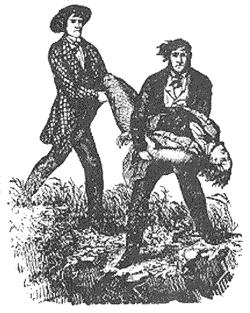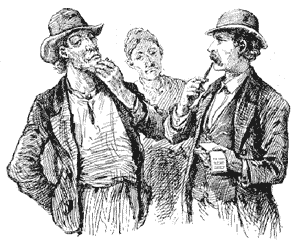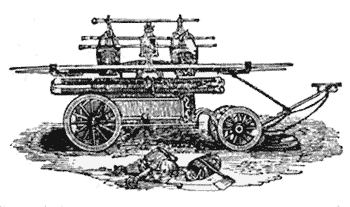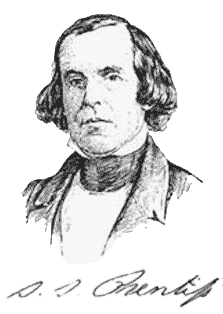"Raymond Years Ago"
By George W. Harper
Journalist - Editor - Owner Of Hinds County Gazette 1845-1883
A Series Published in the Hinds County Gazette, 1878-1879
From the Gillespie Collections edited by Pattie Adams Snowball and Rebecca Blackwell Drake
Home Page
Harper Arrives in Mississippi
Vicksburg & Meridian RR
Businesses in 1844
The Raymond Bar
Early Merchants
1844 Businesses
Seat of Justice
Cotton Industry
Early Churches
Establishment of Schools
John B. Peyton
Raymond Area Homes
Medicinal Resorts & Spas
The Mexican War
Early Churches
Early Schools
Raymond Female Institute
Raymond Military Institute
McNutt-Foote Debate
1844 Presidential Election
Local Elections of 1845
Literary Raymond
Raymond Fires
Old Log Jail
Death of Jos. Stewart
Murder of Benj. Sims
Duel Ends in Death
Raymond & Bolton RR
Harper Elected Mayor
Chaos at Oak Tree Hotel
Great Fire of 1858
Early Area Settlements
-
Amsterdam
-
Yeizer's Store
-
Newtown
-
Meridian Springs
-
Sturgiss Store
-
Dry Grove
-
County Line
Rev. Fisk's Biology Class
Fisk Charged with Fraud
Fleetwood Tragedy
Local Racetracks
Dignitaries Visit Raymond
Winning the Lottery
Fire Company No. 1
"Devoted & Valued Friend"
Tribute to Amos Johnson
Yellow Fever Strikes Raymond
Doctors Treating Victims
Cooper's Well
Mississippi Springs
Newspaper Entrepreneurs
Yankees Sack Gazette Office
Fate of Editorial Giants
Henry Clay Defeated in 1844
Stray Cats in Raymond
"A Remarkable Occurrence"
Blow That Punky Bell to Hell"
Isom Bldgs Destroyed
1851 Gubernatorial Election
Union Ticket Sweeps State
New Raymond Courthouse
Gibbs Building Rebuilt
Hinds Co. Poor House
Schools Struggle
Murder of Addie Owens
War comes to Raymond
The Battle of Raymond
Willie Foote Captured
Make-shift Hospitals
Yankees Occupy Raymond
Raymond Lodge No. 21
Odd-Fellows' Graveyard
Bolls Incarceration
Crimes Blamed on Whisky
Peyton's Willow Tree Prank
Politics in Raymond
Presidential Election 1860
Hinds Co. for Succession
Raymond Fencibles Organized
Churches Reorganize
The Clinton Riot of 1875
Why the Great Uneasiness?
Deaths of Sivley & Thomson
"Kill the Raymond Men"
Harrison Election
Political Gatherings
Event at Dupree's Grove
Presidential Election 1876
Governor Ames Impeached
Great Wrongs Investigated
Fight the Devil with Fire
Reconstruction Era
Harper Ends with Poetic Vision
Part X
A Tragedy at Fleetwood
We departed slightly from “the text,” a week or two ago,
and described several localities that were once points of interest in the
county, but which are now unknown - having passed from the map and almost from
the mind of the oldest inhabitant. Unintentionally we omitted a settlement which
was quite well known 40 to 45 years ago, and which figured in a tragedy which
caused much
 remark at the time.
Fleetwood had a postoffice, and a tavern, and
was on the much traveled road from the Yazoo and Madison country to Vicksburg;
or to be more specific, its location was between Brownsville and Edwards, near
Queen’s Hill. Such was the travel along the road that often, so we have been
informed, there were dozens of wagons and hundreds of travelers at the Fleetwood
Inn night after night and, besides, being a postoffice and cross-roads, the
people of the neighborhood made it a point of frequent social resort.
remark at the time.
Fleetwood had a postoffice, and a tavern, and
was on the much traveled road from the Yazoo and Madison country to Vicksburg;
or to be more specific, its location was between Brownsville and Edwards, near
Queen’s Hill. Such was the travel along the road that often, so we have been
informed, there were dozens of wagons and hundreds of travelers at the Fleetwood
Inn night after night and, besides, being a postoffice and cross-roads, the
people of the neighborhood made it a point of frequent social resort.
Pat Sharkey, a very intelligent, substantial and determined man, lived on his plantation near Fleetwood. He was a Magistrate, and it was the period of the threatened insurrection, headed by the Murrell gang, when every man looked upon every other man with suspicion. Men had been arrested, as suspicious characters, and, no evidence appearing to Squire Sharkey’s satisfaction had been discharged by him. This displeased a Vigilance Committee in Madison county, and they threatened to visit Sharkey and punish him for dereliction of duty. They came down in a body towards Sharkey’s place, but he stepped over to Fleetwood, preferring to receive his visitors there than at home. He thoroughly armed himself, and retired to a room in the Fleetwood Inn, and fastened the doors quite securely. He witnessed their approach. When they attempted to break into his room, he commenced firing. The leader of the party fell dead, and some others were wounded. Sharkey, also, was severely wounded in the wrist. The committee returned to Madison without arresting Sharkey. As far back as 1855 not a trace of Fleetwood was visible save the gentle eminence on which the Inn stood. Indeed, it was then the centre of a large cotton field about midway between the then residences of Dr. Catchings and Mr. Reynolds, and a few miles from the now prosperous town of Bolton.
Peyton and Dillon Racetracks
 At an early period after Raymond was settled, a race course
was laid out on what has long been known as The Prairie, on Maj. Peyton’s land,
adjoining the town. Many of the finest horses of the Southwest appeared on the
track while it was in use, and large numbers of sporting men were in the habit
of attending. About 1840 or ’41, however, a horse fell, while running, and broke
his neck - and that catastrophe, we believe, broke up racing on the Raymond
course. The prairie was afterwards sodded with Bermuda by Maj. Peyton, encircled
with a Cherokee hedge, and used as a pasture until the war. The hedge having
been destroyed during the war, the Prairie has since remained “out.”
At an early period after Raymond was settled, a race course
was laid out on what has long been known as The Prairie, on Maj. Peyton’s land,
adjoining the town. Many of the finest horses of the Southwest appeared on the
track while it was in use, and large numbers of sporting men were in the habit
of attending. About 1840 or ’41, however, a horse fell, while running, and broke
his neck - and that catastrophe, we believe, broke up racing on the Raymond
course. The prairie was afterwards sodded with Bermuda by Maj. Peyton, encircled
with a Cherokee hedge, and used as a pasture until the war. The hedge having
been destroyed during the war, the Prairie has since remained “out.”
|
While the Raymond Race Course was in use there was also another six miles southwest of the town, on Col. Dillon’s land, known as the Oakland Course. We do not know that an accident of any kind ever occurred at Oakland but it ceased to be used for racing with the fall of 1844. The Fairs of the State having pretty generally been turned into horse shows, have to a great extent superseded the race track of the olden time. Whether the public morals and horse flesh have been improved or injured by the change, it is not necessary for us to inquire, but it must be conceded that we now see few fine horses in this part of the county.
Dignitaries Visit Raymond
|
Raymond has been visited in its time by many of the most noted men of the southwest. Gen. Jackson and his army from Tennessee, on their way to meet Packingham, at New Orleans, passed within sight of the ridge on which the town now stands. After the building of the town, Geo. Poindexter and Robt. J. Walker met in discussion here, and here Sergeant S. Prentiss made his first speech in that memorable canvass which gave him a world-wide reputation, and brought to him the eyes and sympathies of the nation. McNutt often addressed the people here, and Gov. A. G. Brown and P. W. Tompkins, and Gov. H. S. Foote, and Col. Jeff Davis, and Judge Sharkey, and F. E. Plummer, and A. K. McClung; and here we heard Gen. Sam Houston for the first time, soon after Texas had been annexed, and when he was beating about for a healthy immigration. And here Gen. Andrew Jackson, in the evening of his days, met our citizens and took them by the hand with all the cordiality of a father welcoming his children. The pulpit of Raymond, too, has been graced at sundry times with the most noted Divines, of all the denominations known to Mississippi and the southwest.
Winning the Lottery
We have never regarded Raymond as “a lucky town,” as that term is usually applied. Indeed, in looking back at its history for 35 years, we cannot but say that it has been rather as unlucky place -a village of calamities, rather than a village of good fortune. It is true, it has been peculiarly blessed by Providence with uniform good health, with exemption from epidemics, with enterprising business men, with intelligent and industrious working men - but Providence has not often smiled bountifully on their efforts and labors. With all the zeal of the citizens in behalf of many good and laudable enterprises, calamity has often come at the moment that success seemed within reach, and to the ground have been dashed the fondest hopes and the most cherished desires. Private as well as public enterprises have appeared to share a common fate, and failure has so often followed upon failure, and disaster upon disaster, that there are many among us who are ready to write FAILURE upon any undertaking whatsoever before its design and scope is fairly unfolded. We can now call to mind, running back over thirty-five years, but a single instance of good fortune befalling any of our citizens although doubtless, many others have occurred of which we have not heard, or having heard, have forgotten.
 In the year 1857, A. R. Johnston, Jos. Gray, B. F. Edwards,
and the Gazette printing office, invested $60.00 in a package of tickets in
Swan’s Georgia Lottery - Johnston advancing $30, and Gray, Edwards, and the
Gazette office $20 each. In due time the returns of the drawing came, when it
appeared that the package of tickets had drawn $17.50. The $17.50 was reinvested
in the next scheme. Presently returns came from that, and the $17.50 had
produced $2.50. The $2.50 as before was instantly reinvested, and in a few days
came the news that the $2.50 had drawn one-fourth of the $40,000 prize, that is
to say $10,000. The ticket was at once sent to Brown & Johnston, the then
bankers of Vicksburg,
In the year 1857, A. R. Johnston, Jos. Gray, B. F. Edwards,
and the Gazette printing office, invested $60.00 in a package of tickets in
Swan’s Georgia Lottery - Johnston advancing $30, and Gray, Edwards, and the
Gazette office $20 each. In due time the returns of the drawing came, when it
appeared that the package of tickets had drawn $17.50. The $17.50 was reinvested
in the next scheme. Presently returns came from that, and the $17.50 had
produced $2.50. The $2.50 as before was instantly reinvested, and in a few days
came the news that the $2.50 had drawn one-fourth of the $40,000 prize, that is
to say $10,000. The ticket was at once sent to Brown & Johnston, the then
bankers of Vicksburg,
 with instructions to collect immediately in American Gold.
Prizes were payable in that lottery after sixty days, and very soon after the
expiration of that period, Brown & Johnston sent to Raymond, in $20 gold pieces,
$5,000 for Amos R. Johnston, and $1,666.66 for Jos. Gray, B. F. Edwards and the
Gazette office, less 2 per cent, the charge for collecting and forwarding funds.
None of the gentlemen named would now, perhaps think of investing a dollar in a
lottery. At that period, however, much money was thus sent abroad annually, and
the above was, to the best of our knowledge, the total sum returned. At this day
but few of our people have money that they could spare for such a purpose, but
if per chance they should ever have, they will allow us to suggest, that
lightning never strikes twice in the same place, and that as unlucky a town as
Raymond need not expect ever again to beat a Lottery; and further, that Josh
Billings, an eminent philosopher, was no doubt correct when he declared that he
“would never purchase lottery tickets so long as he could hire a man to rob him
at reasonable wages.”
with instructions to collect immediately in American Gold.
Prizes were payable in that lottery after sixty days, and very soon after the
expiration of that period, Brown & Johnston sent to Raymond, in $20 gold pieces,
$5,000 for Amos R. Johnston, and $1,666.66 for Jos. Gray, B. F. Edwards and the
Gazette office, less 2 per cent, the charge for collecting and forwarding funds.
None of the gentlemen named would now, perhaps think of investing a dollar in a
lottery. At that period, however, much money was thus sent abroad annually, and
the above was, to the best of our knowledge, the total sum returned. At this day
but few of our people have money that they could spare for such a purpose, but
if per chance they should ever have, they will allow us to suggest, that
lightning never strikes twice in the same place, and that as unlucky a town as
Raymond need not expect ever again to beat a Lottery; and further, that Josh
Billings, an eminent philosopher, was no doubt correct when he declared that he
“would never purchase lottery tickets so long as he could hire a man to rob him
at reasonable wages.”
Raymond Fire Company No. 1
But one effort has ever been made in Raymond, so far as we know, to organize a Fire Company. That was in 1858 or 1859, after the burning, we believe, of Alex. Belcher’s house, and which came nigh destroying the buildings adjacent. A company was immediately formed - splendidly officered - and the subscriptions for the purchase of apparatus were munificent, many of the citizens contributing $25.00 each. Huge ladders were bought, iron hooks with long handles were supplied, 50 to 100 leather buckets were received from the north, light carriages were provided for the rapid transportation of the machinery, and a house was built in which to keep the carriages and machinery.
 We do not remember that the company ever turned out even
for a fancy parade or drill, but we do know that in less time than a man could
have earned the money invested, the apparatus, and machinery, leather buckets
and all, became scattered, and at the big fire of 1858 the company and its
arrangements were not seen or heard of. When last we saw the house which was
built to contain the implements, it had been converted into a wood shed, and the
fire of Oct. 1863 consumed it. And that was the end of Raymond Fire Company No.
1, though its motto, “Rough and Ready,” which was to be emblazoned upon every
article of its property, will no doubt live forever.
We do not remember that the company ever turned out even
for a fancy parade or drill, but we do know that in less time than a man could
have earned the money invested, the apparatus, and machinery, leather buckets
and all, became scattered, and at the big fire of 1858 the company and its
arrangements were not seen or heard of. When last we saw the house which was
built to contain the implements, it had been converted into a wood shed, and the
fire of Oct. 1863 consumed it. And that was the end of Raymond Fire Company No.
1, though its motto, “Rough and Ready,” which was to be emblazoned upon every
article of its property, will no doubt live forever.
The following notice by George Harper was featured in the next issue of the Gazette, January 23, 1879, regarding the "Lottery in Raymond."
NOTICE.
Squire Gray thinks more of the details of “the $10,000 lottery” affair should be published, than were given in our narrative last week, and hence writes the following for publication:
Raymond, Jan. 23, 1879
To the Editors of the Gazette:
In the Gazette of the 22d I notice under the head of
“Raymond Years Ago, No. 10,” mention made of a transaction which occurred in
Raymond, as stated, in 1857, and which has slept from public view till now; in
the particulars whereof I think your memory is slightly at fault. Since then
this matter has been made public, allow me to “vindicate the truth of his story”
by assisting you in the narrative. In this I shall go more into detail. The
proposition came from myself to purchase a package of tickets, costing $60.
Johnston took a half interest, Edwards one-third of the other half, Gray a
third, and the Gazette office the remaining third. Gray was requested to
make purchase of the tickets, which he did of an agent in Vicksburg. Your
statement of the result of the several drawings, are about correct, with this
omission, viz: that in each case the report of the drawings came to Gray as an
individual—not as a member of a company; that the other members of the company
were not known in the transaction outside of the said company; and that the
other members knew nothing about it except as reported by Gray. With respect to
the collection of the prizes it was substantially thus: Johnston seemed to
entertain doubt as to the fact that we had drawn so large a prize—asked me for
the ticket—took it and was off to Vicksburg next day. On his return he reported
to me it was a fact, we had drawn the $10,000, and had employed Brown & Johnston
to collect the money for us, &c. Whether any one or more of the parties got his
share in gold, I know not, but I know that I got my share in paper, with the
loss of thirty odd dollars which they claimed as commissions for sending our
money to Corning & Co., New York, without authority, and making us pay for it.
You err in the several amounts paid in by parties at the start. I will give the
rue figures: Johnston paid $30, Edwards $10, Gray $10, Gazette Office
$10. I do not object to the publicity of this matter myself, and should not have
appeared in print in relation to it, but for being made to occupy (what I
conceive to represent) the position of “a side show” arrangement in a circus
wherein I was “ringmaster” in fact.
Respectfully,
Jos. Gray
Historic note: In the margin of the
clippings, Mrs. H. B. Gillespie wrote that Amos R. Johnston died in
Cincinnati, Ohio, June, 1897.
All photographs, drawings and illustrations were edited into the series by Pattie Snowball and Rebecca Drake.
Copyright © 2008 Pattie Adams Snowball, James and Rebecca Drake

